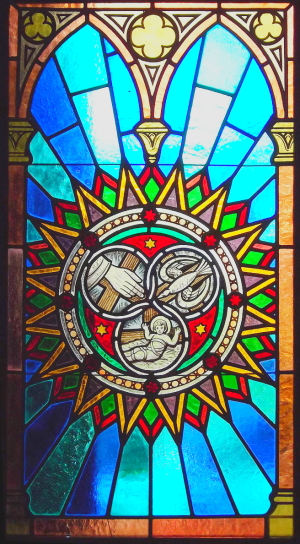
A stained-glass window with a visual representation of the Holy Trinity. Photo courtesy of Wikimedia Commons
SUNDAY, JUNE 4: It’s been one week since Pentecost, and for Western Christians, this marks Trinity Sunday: a time to recognize a central and unfathomable mystery of the Christian faith. Believers hold that all members of the Blessed Trinity—the Father, the Son and the Holy Spirit—are equal, uncreated and infinite, and a celebration of the Christian doctrine of the Trinity is celebrated across Western liturgical churches.
Though the Holy Trinity is honored every Sunday, the early church observed no specific day in honor of this holy mystery until Thomas Becket (1118-70 CE) helped spread the idea of an observance of such a day, saying that the day of his consecration would be held as a new festival for the Holy Trinity. Even still, a day set aside solely for recognizing this mystery continued to vary in several regions until Pope John XXII accepted the festival into the official calendar of the Western Church, in 1334 CE.
IN THE CHURCH
White shines from the décor and vestments of most Western churches today, as the faithful ponder the one God that is three Persons. For many centuries, Christian leaders have taught that this mysterious truth must be believed by true followers of the faith, as a joyous Gospel passage proclaims that God’s nature has been revealed: “Going therefore, teach ye all nations, baptizing them in the Name of the Father and of the Son and of the Holy Ghost.”
It’s said that no mortal can truly grasp the concept of the Holy Trinity, but efforts can be made! Try picking a shamrock today, or a viola tricolor; light a candle with three flames; or decorate a home altar with symbols of the Trinity. CatholicCulture.org has more ideas.
Note: Trinity Sunday falls the first Sunday after Pentecost in the Western Christian Church each year, and on Pentecost Sunday in the Eastern Orthodox Christian Church.